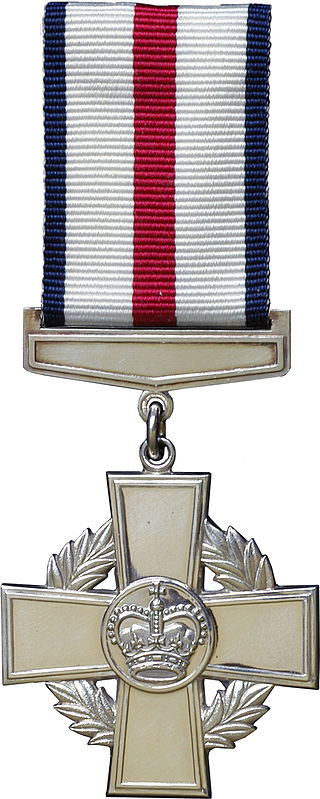
The Distinguished Service Order (DSO) is a military decoration of the United Kingdom, as well as formerly of other parts of the Commonwealth, awarded for operational gallantry for highly successful command and leadership during active operations, typically in actual combat. Since 1993 it has been awarded specifically for "highly successful command and leadership during active operations", with all ranks being eligible. It is a level 2A decoration (order) in the British system of military decorations.

The Distinguished Conduct Medal was a decoration established in 1854 by Queen Victoria for gallantry in the field by other ranks of the British Army. It is the oldest British award for gallantry and was a second level military decoration, ranking below the Victoria Cross, until it was discontinued in 1993 when it was replaced by the Conspicuous Gallantry Cross. The medal was also awarded to non-commissioned military personnel of other Commonwealth Dominions and Colonies.

The Distinguished Service Cross (DSC) is a third-level military decoration awarded to officers; and, since 1993, ratings and other ranks of the British Armed Forces, Royal Fleet Auxiliary and the British Merchant Navy have been included. Additionally, the award was formerly awarded to members of other Commonwealth countries.

The Distinguished Service Medal (DSM) was a military decoration awarded until 1993 to personnel of the Royal Navy and members of the other services, and formerly to personnel of other Commonwealth countries, up to and including the rank of Chief Petty Officer, for bravery and resourcefulness on active service at sea.

The Military Cross (MC) is the third-level military decoration awarded to officers and other ranks of the British Armed Forces, and formerly awarded to officers of other Commonwealth countries.
To be mentioned in dispatches describes a member of the armed forces whose name appears in an official report written by a superior officer and sent to the high command, in which their gallant or meritorious action in the face of the enemy is described.

The Conspicuous Gallantry Cross (CGC) is a second level military decoration of the British Armed Forces. Created in 1993 and first awarded in 1995, it was instituted after a review of the British honours system to remove distinctions of rank in the awarding of gallantry decorations. The Victoria Cross is the only higher combat gallantry award presented by the United Kingdom.

The Conspicuous Gallantry Medal (CGM) was, until 1993, a British military decoration for gallantry in action for petty officers and seamen of the Royal Navy, including Warrant Officers and other ranks of the Royal Marines. It was formerly awarded to personnel of other Commonwealth countries. In 1943 a Royal Air Force version was created for conspicuous gallantry in action against the enemy in the air.
The Rhodesian honours system was established at the time that Rhodesia unilaterally declared itself a republic in March 1970, when a system of military and civil decorations and awards was instituted by Presidential Warrant in November 1970.

The Bronze Cross of Rhodesia was a Rhodesian military decoration for gallantry.

The Grand Cross of Valour was Rhodesia's highest military decoration, awarded for conspicuous valour by members of the Security Forces in combat.
The Conspicuous Gallantry Decoration was Rhodesia's highest civil decoration and the second-highest award available to members of the armed forces. It was awarded for acts of the highest gallantry and brave conduct of an outstanding order in a non-combatant capacity.
The Independence Decoration was a Rhodesian civil decoration awarded to persons who played a notable and significant part in the Unilateral Declaration of Independence in 1965.
The Police Decoration for Gallantry was a Rhodesian gallantry award. It was awarded for gallantry to members of the British South Africa Police, Police Support Unit, and Police Reserve.
The Police Decoration for Gallantry was a Rhodesian gallantry award. A handful were awarded for conspicuous gallantry to members of the British South Africa Police, Police Support Unit and Police Reserve.
The Defence Cross for Distinguished Service was a Rhodesian military decoration awarded for distinguished service to Rhodesia's armed forces.
The South African Police Star for Outstanding Service was a decoration that existed between 1979 and 2004. Recipients are entitled to the post-nominal letters SOE, standing for Stella Officii Egregii, the Latin form of the name.

In 1895, Queen Victoria authorised Colonial governments to adopt various British military decorations and medals and to award them to their local military forces. The Colony of Natal introduced this system in August 1895 and, in 1897, instituted the Distinguished Conduct Medal (Natal), post-nominal letters DCM.
The Meritorious Conduct Medal was a Rhodesian military decoration for brave and gallant conduct.

Captain Chris F. Schulenburg is a South-African born former Rhodesian Army soldier. He is one of only two recipients of the Grand Cross of Valour, Rhodesia's highest military honour and also received the Silver Cross of Rhodesia. Schulenburg received the Grand Cross of Valour in 1978 for an action in which he penetrated an enemy position before returning to his unit and leading a successful assault.











